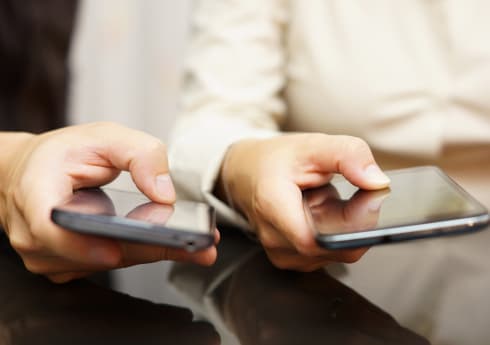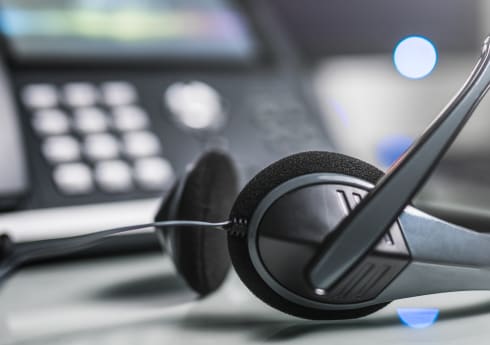How to claim your sole trader mobile phone as a business expense
HMRC doesn’t make claiming mobile phone expenses as self-employed easy to understand! But you can claim your phone expenses if you get the paperwork right.
If a mobile phone is bought and registered under your name, not your business name, you’ll have a much harder time claiming expenses. Get a business mobile contract to make your claims easier.

Claiming mobile phone expenses self-employed: what to claim
If your business isn’t limited, only your business use can be claimed. To get the most bang for your buck, it’s best to follow the rules closely to get your taxes back. But what can you claim?
To claim anything on your contract easily, it’s best to have a business phone contract. Your phone will be registered under your business name and your business name appears on the invoices, so you can submit them to HMRC.
Here’s what sole trader mobile phone expenses you could claim:
- The cost of buying the mobile phone
- Business mobile phone contract
- Mobile calling costs for business calls
- Any additional call costs outside your regular bill
- Pay As You Go mobile phone or SIM as a marginal cost
- VAT if you’re VAT registered
Mobile phone as a business expense on personal use contracts
While having a business mobile phone makes your claims easier, some self-employed use the same phone for business and personal use. Read our guide to business and personal use mobiles to see the difference.
So how do you work out what you can claim?
The most popular way is to work out an average cost and number of business calls on your personal phone. You then use this average to make your claims for the year. Here’s how it works:
- Check your phone bills after a few months. Usually, three to four months.
- Find your business calls on your mobile phone bills.
- Calculate the percentage of business calls vs your total call amount.
- Include all VAT and any line rental charges.
- Use this percentage to complete your business expense claims.
This percentage calculation is meant to be an average. The rule for mobile phones as business expenses is that as long as it’s reasonable, it’ll be accepted.
Many of us use the flat rates from HMRC to calculate sole trader mobile phone expenses, but you could end up missing out on your claims.
Make sure you keep your phone bills on file, so you can submit them as evidence if the taxman comes calling. If you’ve got any doubts or are struggling to work out what to claim, get in touch with an accountant.
iCompario tip: What if my business calls vary?
In this case, an average percentage won’t work as well, and you could be missing out on sole trader mobile phone expenses.
To get the most from your mobile phone as business expense claims, we recommend using a separate mobile phone or SIM for business use only.
How to change your mobile from personal to business use
Contact your provider. For sole traders, claiming mobile phones as business expenses can be done quickly if you switch your details. You need to do this by changing your name and address on the account.
Ask your provider what your contract will be if you switch over to a business mobile contract. See our guide to sole trader mobile phone contracts to find out more.
However, this will affect your contract as you’ll be switching from a personal to business use deal. This may affect your data allowance, minutes, texts, and monthly bill.
It may work out cheaper for you to take a contract out with a different provider instead. Compare business mobiles now to see what deals you could get.
Can I claim if I use a mobile for business use and personal use?
Yes. Claiming mobile phone expenses as self-employed is allowed, as long as you’re registered as a sole trader. And the phone should be mostly used for business.
If you’re going to claim your mobile phone as business expenses, then personal use is allowed but shouldn’t be the sole or main purpose of your phone.
How does filing for sole trader mobile phone expenses work?
A Self-Assessment is when you need to be claiming mobile phone expenses. Self-employed workers pay tax on profits, not your total, so typically the more expenses you claim the less tax you pay.
The key is to ensure you’re including allowed expenses every time you do your Self-Assessment. This ensures you’re sending accurate details to HMRC of your business expenses and you’re paying the right amount of tax.
A Self-Assessment for sole traders can be completed online or you can have an accountant file it for you.
iCompario tip: Remember to claim on broadband too!
As more of us are working from home these days, it’s worth claiming your broadband expenses too! Just like your mobile phone as a business expense, you’ll have to work out how much of your internet time is spent on business use vs personal use.
Check out our guide to broadband to see if upgrading to business broadband is worth it for you.
Can I use my bank statements as receipts for taxes?
If you’re filing a Self-Assessment, bank statements are acceptable evidence of business expenses. Mobile phone monthly bills are accepted too, and you may need this as further evidence of your sole trader mobile phone expenses.

How can I maximise my tax returns?
Sole trader mobile phone expenses aren’t just the only thing you can claim! To make the most of your Self-Assessment, see our top five tips below:
- Work out your business use time on your mobile. Make sure to look through a few months of bills to work out your average percentage, so you’re getting an accurate amount reclaimed.
- Ensure you’re claiming what you can. Remember you can reclaim on your landline and business broadband costs as well.
- Consider tracking your mileage. For sole traders often on the road, using a vehicle tracker gives you more accurate mileage data to give you more accurate reclaims.
- Use an accountant. They do all the paperwork for you! However, they can be costly. If you don’t have many claims or are on a budget, consider the next option.
- Claim a trading allowance. Every sole trader in the UK can claim £1,000 in business expenses. It’s quick and easy. But if you claim this allowance, you can’t claim anything else!
Getting a mobile phone as business expense: is it worth it?
Yes. Having a business mobile unlocks many benefits for you, including added extras to your contract and it saves you time when you file your Self-Assessment.
Here’s what you need to know.
1. Merge your business number with your landline
Our of the office for the day? No worries. Your landline number goes with you on your business mobile phone. This helps you stay in touch and looking professional.
2. Suitable insurance for your mobile phone
Mobile phones are how we stay in touch with so many of our clients and customers. If your mobile was broken or lost for a week, how much profit would you lose?
That’s why getting a good level of protection for your phone is so important. Many business phone deals include insurance, including protection for screen damage.
3. Easier time filing your Self-Assessment expenses
If you buy a phone for personal use, you could be missing out on your tax reclaims. Get a business phone contract to make your sole trader mobile phone expenses quick and easy.
The latest phones at affordable prices
You could get the latest iPhone on a monthly contract at an affordable price. Many of these deals include unlimited data and minutes. Can you claim an iPhone mobile phone as a business expense? Yes. With the right paperwork and if you use it for business use.
See what deals you could get now by comparing the market.
What are the rules for limited companies?
The tax rules for limited companies are different from those for sole traders. Mobile phones are free from benefit in kind (BIK) tax under the right conditions.
If you provide a mobile phone for business and private use, it’ll fall under the exception.
Just make sure it’s registered and billed under your company name. See our mobile phone benefit in kind guide for more details.



